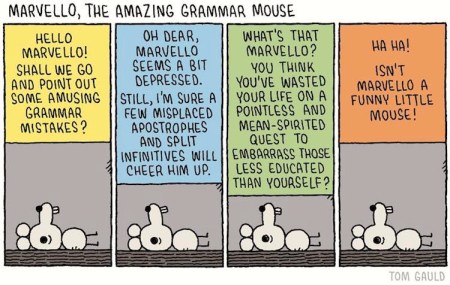Archive for the ‘Peeving’ Category
March 18, 2021
A Tom Gauld cartoon, originally from the Guardian of 8/23/14, then in his collection Baking with Kafka (2017):
 (#1)
(#1)
Some peeve to feel superior, some say they peeve to shame others into learning the “correct” variants (it’s for their own good), some say they peeve to relieve the physical distress of hearing variants they’ve been taught to view as incorrect (just make it go away).
(more…)
Posted in Linguistics in the comics, Peeving, Usage attitudes | Leave a Comment »
March 16, 2021
Two evergreen topics in grammar and usage: so-called “split infinitives”, where some usage critics have insisted that they must always be avoided, however unnatural the results of this avoidance are; and modifier attachment, where jokes are often made about one of the potential attachments, however preposterous the interpretation associated with this attachment is.
The two topics are connected through their unthinking devotion to dogmas of grammatical correctness: avoid split infinitives, avoid potential ambiguity. A devotion that leads adherents down the thorny path of usage rectitude to using unnatural syntax and entertaining preposterous interpretations.
But first, the thorny path. The (tough) counterpart to the (easy) primrose path.
(more…)
Posted in Ambiguity, Formulaic language, Modification, Modifier attachment, Movies and tv, Peeving, Plays, Split infinitives, Stock expressions, Syntax, Usage advice, Usage attitudes | Leave a Comment »
November 12, 2019
Tell it to Kim. Tell it to me. Tell it to Kim and I.
The new paradigm for case-marking of pronouns, including the nominative conjoined object (NomConjObj) in to Kim and I — now judged to be the correct form by a large population of young, educated American speakers, as against the judgments of older speakers, who use instead accusative conjoined objects (AccConjObj), as in to Kim and me.
Entertainingly, the new paradigm is evidenced in tv comedies in which grammatically fastidious characters freely use NomConjObj and even admonish those who use AccConjObj.
(more…)
Posted in Errors, Movies and tv, Peeving, Pronoun case, Style and register, Usage, Usage advice, Variation | 5 Comments »
February 25, 2019
The title of this cartoon, which turned up yesterday in FB’s Our Bastard Language group:
 (#1)
(#1)
The captain is both a pirate and (as it turns out, once you figure out what the man intends to say) a grammar nazi, bent on correcting his crew’s inferior (as he sees it) English — hence the portmanteau grammar pirate. So the cartoon is, primarily, about (stereotypical) pirate talk (which will take us to the West Country of England), but also about peeving.
(more…)
Posted in Books, Holidays, Linguistics in the comics, Movies and tv, Peeving, Pop culture, Portmanteaus, Snowclonelet composites | Leave a Comment »
February 22, 2019
Revived on Facebook recently, this 2/20/12 Cyanide and Happiness cartoon by Jay A.:
 (#1)
(#1)
The first three panels are routine (but annoying): Character 1 produces an example of AccConjSubj (the non-standard Accusative Conjoined Subject me and Steve) and Character 2 reacts with hysterical peeving, becoming physically sick from experiencing the AccConjSubj.
But then we discover that we’re not in anything like the real world, where someone speaks and someone else hears what they say, but instead in the Land of Supertitles, where someone produces a banner with writing on it and someone else reads it. That has to be what’s going on — since otherwise how could Chr2 know how Chr1 was spelling what they said? YOUR instead of YOU’RE, ALLERGYS insead of ALLERGIES, AFFECT instead of EFFECT, THEIR instead of THEY’RE, ITS instead of IT’S — they’re all homophones, so how could Chr2 know that Chr1 was spelling them wrong? UNLESS CHR2 COULD READ WHAT CHR1 WAS SAYING.
(more…)
Posted in Idioms, Linguistics in the comics, Peeving, Phonetics, Pronoun case, Sociolinguistics, Syntax, Usage attitudes | 3 Comments »
August 13, 2018
In a vivid linguistics dream in the am hours of the 10th, a page of linguistic data gold that (in the dream) I carefully saved to my computer — my dream computer, of course — so I could post about it triumphantly later in the day. Alas, later in the day my dream computer was off-line, so to speak, and all I had from that marvelous page of data when I woke briefly was this not entirely certain recollection:
We never stop(ped) rolling over them / them over in Syntax Country.
Two possible contributors to this dream message.
(more…)
Posted in Books, Death notices, Music, Oxymoron, Peeving, Usage attitudes | Leave a Comment »
November 4, 2017
A PartiallyClips from 2014, which somehow slipped my notice:

The officer in the cartoon — I’ll call him Andy, after E.B. White — objects to (1) broke as the PSP of break and to (2) What did you do that for? as (incorrectly) ending a sentence with a preposition, and he’s about to object to the driver’s use of (3) hyperbolic or intensive literally. Meanwhile, Andy’s partner Bill Strunk (note: the Strunk of Strunk & White’s Elements of Style was called Will) is busy doing usage-retributive damage to the car. Not, I think, the world’s greatest usage assholes, but arguably in the asshole pantheon.
(more…)
Posted in Inflection, Linguistics in the comics, Peeving, Stranded P | Leave a Comment »




